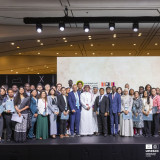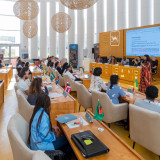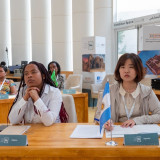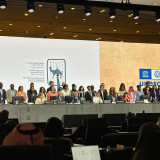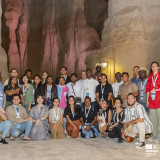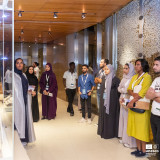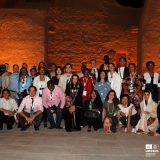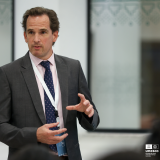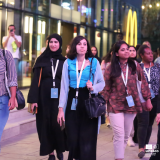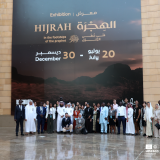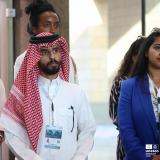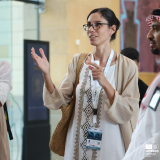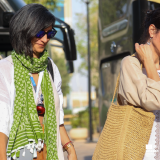World Heritage Young Professionals Forum | 2023

- Location : Saudi Arabia
- Date: 2023
- Participating Countries :
- Partner Institutions : UNESCO, Ministry of Culture - Kingdom of Saudi Arabia, Saudi Heritage Commission
The project
As an integral part of the extended 45th session of the World Heritage Committee, and in the framework of the UNESCO World Heritage Education Programme, the Kingdom of Saudi Arabia through the Saudi Heritage Commission will be hosting the World Heritage Young Professionals Forum 2023 under the theme of “Looking Ahead: The Next 50 Years of Protecting Natural and Cultural Heritage" from 3 to 12 September 2023. The Forum will be developed and implemented with the support of the NGO Diadrasis.
The Forum is an opportunity to understand and assess the achievements of the past 5 decades of the World Heritage Convention; to highlight the crucial role of youth in the heritage ecosystem; and to pave the way for the next generation of heritage professionals, giving voice to their unique approaches to heritage management. The Forum will harness the potential of capacity building and prepare the young professionals in creating a sustainable future for our cultural and natural heritage.
The overall aim of the Forum is to deepen the knowledge and skills of young professionals in protecting, preserving, and promoting natural and cultural heritage for the next 50 years, and beyond. Accompanied by local and international experts, and through a variety of presentations, roundtables, discussions and site visits, the young professionals will collectively explore the significant challenges encountered in managing heritage ecosystems today and will discuss best practices and shared solutions for their future protection. The Forum will address the following sub-themes: climate change, sustainable tourism, and the digital transformation surrounding heritage.
An initial outline of the Forum’s programme is available below. Updates on the programme as well as the final programme will be uploaded on the Forum webpage, in due course.
Contents
Over the past five decades, the World Heritage Convention has protected and promoted humanity’s treasures and transformed the way we value and safeguard heritage. As we celebrate the 50th anniversary of the Convention, it also an occasion for us to look to the future and at the issues that we must tackle together, such as climate change, sustainable tourism, and the digital transformation surrounding heritage, among others. Hence, the theme of the World Heritage Young Professionals Forum 2023 is set as “Looking Ahead: The Next 50 Years of Protecting Natural and Cultural Heritage”. The overall aim of the Forum is to deepen the knowledge and skills of young professionals in protecting, preserving, and promoting natural and cultural heritage for the next 5o years, and beyond. Accompanied by local and international experts, and through a variety of presentations, roundtables, discussions and site visits, the young professionals will collectively explore the significant challenges encountered in managing heritage ecosystems today and will discuss best practices and shared solutions for their future protection.
With an approach rooted in community engagement and public participation and enhanced further by the context and insights provided by the visit to the Al-Ahsa Oasis, the Forum will address the following sub-themes.
a. World Heritage & Climate Change: Climate change is among the greatest threats facing cultural and natural heritage today. One in three natural sites and one in six cultural heritage sites are currently threatened by climate change. In recent years we have seen cultural and natural heritage sites, including many World Heritage sites, threatened by wildfires, floods, storms and mass-bleaching events. At the same time, World Heritage properties also harbour options for society to mitigate and adapt to climate change through the ecosystem benefits, such as water and climate regulation, that they provide and the carbon that is stored in World Heritage Forest sites. Cultural heritage, on the other hand, can convey traditional knowledge that builds resilience for change to come and leads us to a more sustainable future. Through this sub-theme, the participants will discuss the impacts of climate change on the Outstanding Universal Value of World Heritage and explore ways to mitigate and manage these risks, through the use of sustainable traditional materials, construction techniques and other traditional knowledge inherent to heritage communities.
b. World Heritage and Sustainable Tourism: With over 1,000 properties inscribed in 167 countries, World Heritage sites have become some of the most popular tourist destinations in the world. While tourism can bring important economic and social benefits to the heritage communities, it is essential to manage it effectively to avoid negative impacts on the sites and their Outstanding Universal Value. To tackle this challenge, the participants will leverage the existing tools developed by UNESCO and explore the opportunities to promote sustainable tourism at World Heritage sites. Their goal will be to discuss ways to empower local communities to better manage their resources and have a say in how their heritage is presented to visitors, while finding solutions to enhance the visitor experience through an exchange between tourists and the heritage communities that harnesses culture and creativity.
c. Diversity & Representation of World Heritage: Over the 50 years since the World Heritage Convention was adopted, great strides have been made in preserving sites around the world, although there still exists a lack of balance in the type of properties and the geographical areas of the world represented on the World Heritage List. As the next generation takes up the baton of heritage preservation, the importance of equitable representation can be addressed through education in the value of heritage, understanding the true narratives of local and indigenous communities, and protecting their rights and cultural histories. Furthermore, the holistic approach to heritage today extends to include elements that may be cultural, natural, or mixed; tangible or intangible; old or new; and it is essential for the young professionals to draw from the complementarity of these elements in order to manage them sustainably.
d. The Digital Dimension of World Heritage: In the heart of the digital era, the digital aspects of heritage are growing enormously as well, ranging from virtual visits and online exhibitions to inventory catalogues of heritage objects and 3D models of archaeological sites, making it truly accessible in every corner of the world. Through this sub-theme, the young professionals will explore the fundamental role of an inclusive digital environment in promoting and sharing heritage values and in enhancing the protection of our natural and cultural heritage. They will work together to identify ways in which they can support the digital empowerment of their own communities.

